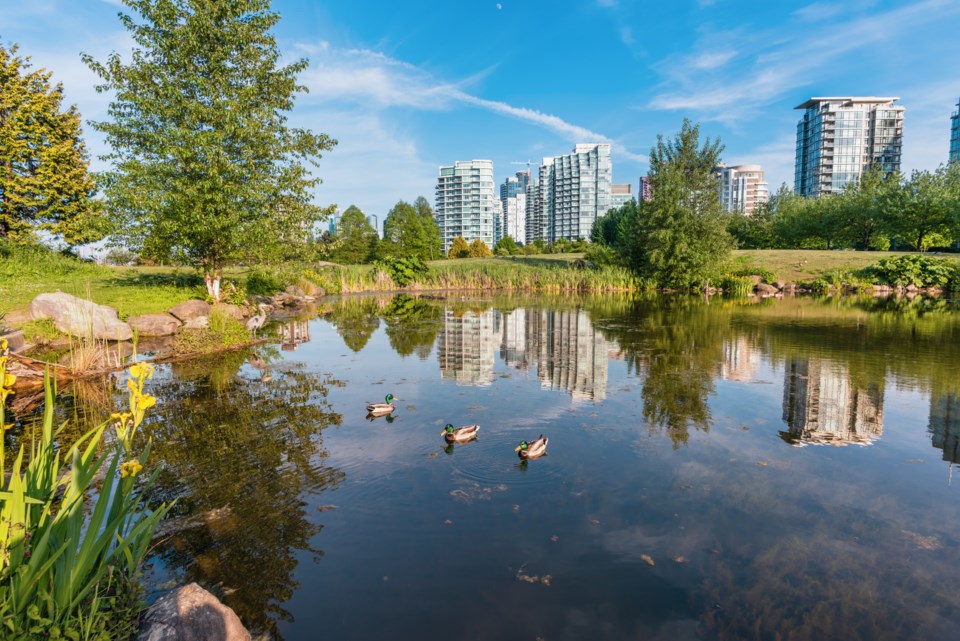Ponds and fountains are more than aesthetic elements, they help mitigate heat and promote biodiversity in urban centres.
Given the increasing heat in Vancouver, one resident is raising concerns about ponds drying up and shut-off fountains, though one expert notes water's role in urban environments is complex and not always a simple cycle.
“Not only do these ponds provide essential areas for wildlife, but the ponds also help to mitigate urban heat island effect,” says local Patricia Gooch. “We are dealing with unprecedented heat and drought, so draining these ponds makes it even worse.”
The City has been shutting off fountains and draining ponds, Gooch says, “all to our detriment.”
Not-so-wet lands
While ponds may be dry, a spokesperson for the Vancouver Board of Parks and Recreation tells V.I.A. that none of the ponds in Park Board spaces have been drained.
Certain ponds across the city, including those at Charleson Park and South Memorial Park are occasionally dry around this time of year because they used to be topped up with millions of litres of potable drinking water to maintain water levels every year, according to the spokesperson.
Gooch says she understands the need to save water, but thinks that the City should be retrofitting the ponds to recirculate water instead.
"Having healthy urban shade trees and heat-mitigating water bodies is part of universal accessibility for people with disabilities. Most people only think of putting in wheelchair ramps or automatic doors, but there's a lot more to universal design than that," she says.
Gooch is also concerned that some ponds are used as settling ponds for urban dust and runoff and allowing the ponds to be dry means contaminated dust has the chance to blow around into the air.
Several non-recirculating water features have been turned off across the city to comply with By-law 4848 and Metro Vancouver's Drinking Water Conservation Plan as the City works to evaluate which ones can be retrofitted to use less water in the future.
“The affected ponds will be considered, along with several other park water features, in the Water Action Plan Update to the Park Board later this year,” says the Park Board spokesperson. “In the meantime, since these ponds are not currently on the list of proposed exceptions to the by-law put forward by City Council and the Park Board, they will retain water naturally (as they do approximately 10 out of the 12 months of the year) as seasonal wetlands.”
The value of water
"Draining urban water bodies is just so shortsighted for so many reasons. The ecosystem services of urban trees and water for mitigating temperature and improving air quality help everyone,” says Gooch.
“Ponds in urban centres are important for lots of reasons,” concurs Dr. John Richardson from UBC’s Department of Forest and Conservation Sciences. “We need ways to promote biodiversity in urban centres.”
However, it is debatable whether or not ponds contribute to cooling on their own; ponds are generally associated with green space and it's the combination that is good for biodiversity he says.
Ponds will have some effect but Richardson questions whether or not it could be measured against the background of a green space.
City Council and the Park Board sought exemptions to the by-law for a handful of non-recirculating water features which have now been switched on.
The ponds, which have proven to be an important habitat for native birds and amphibians, are expected to fill with rainwater during the winter and dry out in the summer says the Park Board spokesperson.
None of the in-park ponds affected by the by-law receives drainage from outside the parks they are situated in, meaning that they don’t play a role in filtering urban stormwater or host dust, adds the spokesperson. Rather, they were designed as aesthetic features.
Not good for green spaces
Nothing will die when you turn off a fountain, but letting ponds around the city go dry means that tree frogs and dragonflies disappear from urban spaces.
“If they dry out they’re dead,” he says, adding that he wouldn’t want to be the one to decide which ones to let go.
He points out that if the ponds are drying out then the trees and plants that are part of the green space are probably water stressed.
“A lot of trees don’t put deep roots down in this coastal area because they would get too wet in the winter,” he explains. “The forest is probably vulnerable to dying or pathogens. It’s not a good sign for the green space.”
Shallow ponds are more vulnerable to drying out and while Richardson says some of the ponds, the more decorative ones, could probably be let go for now it depends on the value of keeping them full of water.
Though the City says there’s no dust issue, Richardson says that most urban ponds have contaminants, but clarifies that concentrations blowing around wouldn’t necessarily make people ill. It is more likely to impact local wildlife.




